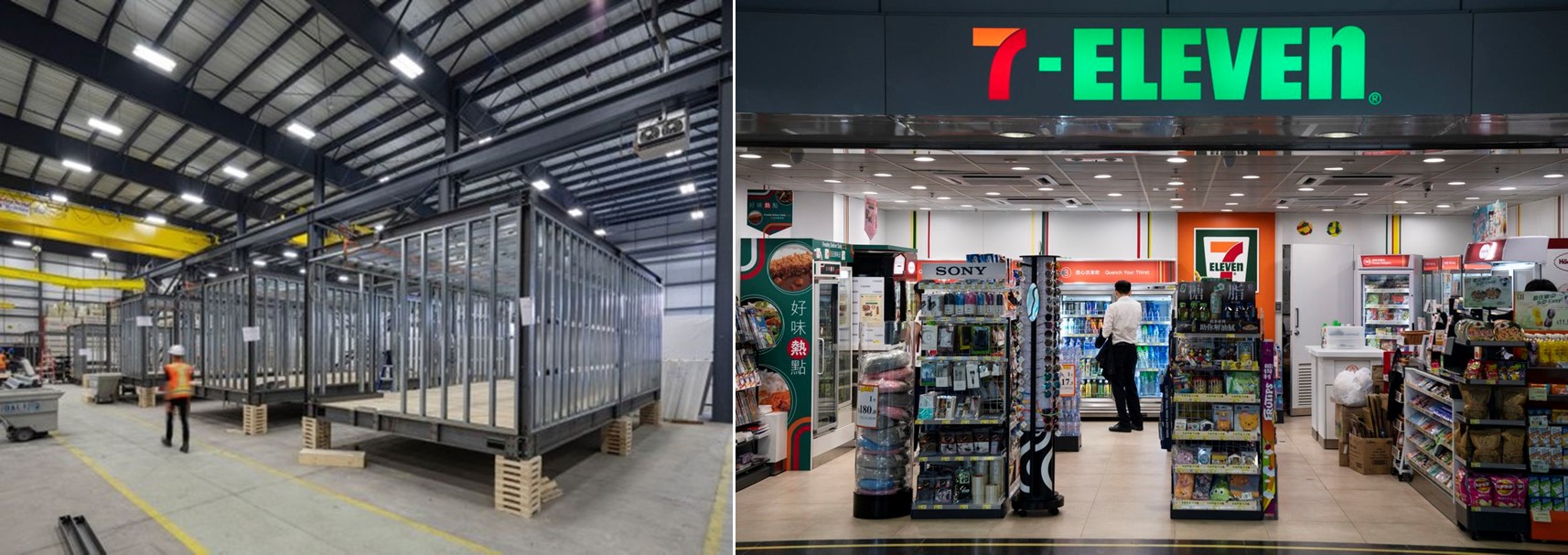Here’s an interesting scenario. What would happen if every person who wants to start a new modular construction factory was told by their investors they had to work in a 7-Eleven convenience store for six months as the new store manager? The catch? They’d receive no prior training and only have their shopping experience as a customer to rely on. At the end of this six-month test, the investors would fully fund their startup—provided they successfully ran the store.

It sounds simple, right? After all, most of us have visited a convenience store like 7-Eleven countless times. You walk in, grab your coffee, maybe a snack, and pay at the register, all in a matter of minutes. But how many of those eager modular startup founders would be able to manage the behind-the-scenes chaos that ensures the store runs like clockwork? Not many, I assume.

Let’s explore the responsibilities of a 7-Eleven manager to understand what our hopeful entrepreneurs would face and what valuable lessons they might gain from such an unusual challenge.
1. The Day-to-Day Operations: A Crash Course in Juggling
Running a convenience store might seem simple to an outsider, but any veteran 7-Eleven manager will tell you otherwise. There’s an endless list of tasks that require attention, often all at the same time. For instance:
Opening and Closing: The store manager must ensure the store opens and closes on time, and this involves a lot more than turning a key in the lock. Setting up the cash registers, restocking shelves, preparing fresh coffee, and ensuring the place is spotless for the early morning rush—all of these must be done before the doors open.
Stocking Inventory: Every item in a 7-Eleven is meticulously tracked and managed. Inventory must be ordered, received, and stocked properly. Run out of Slurpee cups on a hot day? Expect a riot. Meanwhile, over-order perishables, and you’ll end up throwing away profit margins along with expired sandwiches. Modular factory owners would get a firsthand lesson in the balancing act between demand forecasting and waste management.
Merchandising: Everything has its place in a 7-Eleven, and part of the manager’s job is ensuring products are displayed in a way that maximizes sales. In the same way modular factories have to balance aesthetics with efficiency in design, managers must ensure that the store layout works seamlessly for customer flow.
Managing the day-to-day operations would be an immediate and humbling experience for anyone thinking they can coast through on autopilot. There’s no hiding from responsibility when you’re the one in charge of keeping the Slurpee machine in working order and making sure the shelves don’t run empty.

2. Staff Management: A Masterclass in Human Nature
Let’s be honest: construction factory owners rarely get involved in the nitty-gritty of managing hourly workers. But in a 7-Eleven, that’s exactly what they’d be doing every day.
Hiring and Training: Staff turnover in retail is notoriously high. As the store manager, you’d be responsible for recruiting and training new employees regularly. And here’s the kicker—you’d need to do this while juggling the rest of the store’s operations. Entrepreneurs would quickly learn the importance of effective hiring and, perhaps more importantly, training. One untrained employee can mean disaster for a shift. Miscounting change, mishandling a customer complaint, or forgetting to lock up at night—any of these could be catastrophic.
Scheduling: Store managers are often at the mercy of employee availability. As someone aiming to run a modular factory, this could be a crucial lesson in understanding the limitations of a workforce. Creating a schedule that meets everyone’s needs while keeping the store adequately staffed is a lot like constructing a house of cards. One misstep and it could all come crashing down.
Leadership Skills: Keeping morale high is a delicate balance, especially when your team is working late-night shifts or dealing with irritable customers. This responsibility would give future factory owners invaluable insight into how leadership affects productivity. The quick service of 7-Eleven employees directly reflects the manager’s ability to motivate and lead, something entrepreneurs would need to emulate in their factories.
Would modular factory owners—who are used to thinking big-picture—be able to thrive in the high-stakes game of scheduling, staff motivation, and customer service? Perhaps, but they’d need to sharpen their people skills fast.
3. Financial Responsibilities: The Real Test
If modular factory founders ever imagined that running a 7-Eleven would be a break from crunching numbers, they’d be sorely mistaken.
Cash Handling: Managing a store’s finances means balancing the cash registers at the end of each shift, handling deposits, and keeping track of every penny that flows in and out of the business. Sound familiar? It should because just like in construction, any financial oversight in retail can sink the entire ship.
Budgeting and Profit Margins: The store manager must also understand profit margins, which would force modular factory founders to rethink how they view the bottom line. Ordering too many products means losing money; ordering too little means missed sales. The same principles apply in construction, where overestimating costs or misallocating resources can lead to financial disaster.
Running a 7-Eleven forces managers to be accountable for every transaction, teaching entrepreneurs that success often lies in the smallest of details.
4. Customer Service: The Ultimate Reality Check
In a modular factory, most owners rarely deal directly with customers. In a 7-Eleven, they wouldn’t have that luxury.
Customer Complaints: Modular construction may involve working with high-paying clients, but at a 7-Eleven, the customers are often just as demanding—if not more. Dealing with complaints over incorrect prices, expired products, or long lines would push startup founders out of their comfort zones. Handling these issues on the fly is an entirely different ballgame than negotiating modular contracts.
Product Availability: Customers at a 7-Eleven expect everything to be in stock, from snacks to tobacco products. As a manager, running out of key items during peak times could be disastrous. This would teach modular startup founders the value of preparation and understanding consumer needs, as both industries depend heavily on satisfying immediate customer demand.
Dealing with the public day in and day out would be an eye-opener for any aspiring entrepreneur.

5. Compliance and Safety: A Different Set of Regulations
7-Eleven managers are required to ensure their store complies with a host of regulations—much like the modular construction industry.
Health and Safety Protocols: Just like factory settings, 7-Elevens must adhere to strict cleanliness standards. There are food safety regulations, health codes, and local laws to follow. As the manager, you’re responsible for maintaining compliance, or you risk fines, shutdowns, and bad press.
Alcohol and Tobacco Sales: Modular factory owners are used to navigating complex building codes, but in a convenience store, they’d need to stay on top of laws governing the sale of restricted products like alcohol and tobacco. One slip-up and they could lose their license—or their business.
This lesson in compliance would be an excellent crash course in understanding the importance of regulations and how they impact operations.

6. Marketing and Promotions: Learning to Sell
While modular factory owners may be accustomed to high-dollar contracts, selling at a 7-Eleven is about small transactions, multiplied by the thousands.
Promotions and Sales: Each month, 7-Eleven managers are responsible for implementing marketing campaigns—whether it’s a two-for-one coffee deal or discount sandwiches. It’s a unique challenge to make sure these promotions are running smoothly, and modular founders would have to learn how to pivot quickly when something isn’t selling as planned.
Local Marketing: Just as a modular factory needs to be a presence in the community, so does the convenience store. A great manager ensures that their store is involved in local events, charitable causes, and neighborhood promotions. Modular factory founders could benefit from this hands-on approach to localized marketing.
So, Could a Modular Factory Founder Run a 7-Eleven?
At first glance, running a 7-Eleven may seem worlds away from managing a modular construction factory, but upon closer inspection, the skills required overlap significantly. Both require managing inventory, handling financial responsibilities, leading a team, and ensuring customer satisfaction. However, the fast pace and high demands of a 7-Eleven would undoubtedly challenge even the most confident factory owner.
Those who can thrive under the pressure of running a convenience store might just find themselves better equipped to handle the ups and downs of launching a modular factory. After all, if you can keep a 7-Eleven running smoothly, who’s to say you can’t conquer the world of modular construction?
Modcoach Note
In the 1970’s and 80’s, my family started a chain of Convenience Stores in PA. We built it into 17 stores and finally sold them to a larger company. Even though I was a teenager when we started, I was involved in every phase of the operations, from starting new stores, managing them, and in the end, running the entire business.
To this day, I hold convenience store managers in high regard.
.
CLICK HERE to read the latest edition
Contact Gary Fleisher












